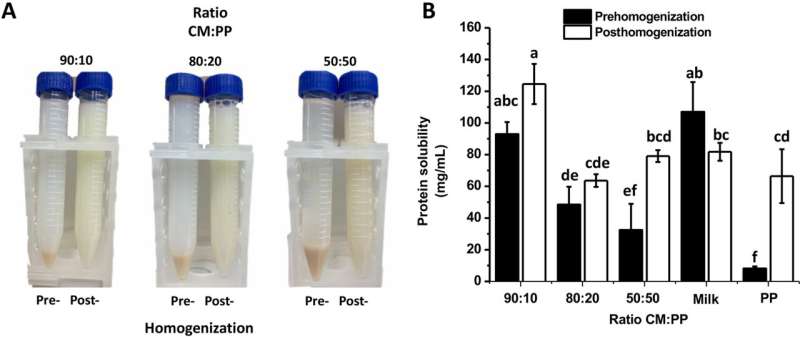'Drink your peas!' Benefits of supplementing cow milk with plant protein

Scientists from the Department of Food Science and Technology at The Ohio State University (Columbus, Ohio, U.S.) have developed a novel method of supplementing cow milk with vegetable protein using readily available current dairy processing equipment. A new report in the January 2022 issue of the Journal of Dairy Science presents the study, which may open opportunities to create new functional, multi-sourced dairy products that could bolster declining fluid milk sales in the United States.
Approximately 80 percent of the protein in cow milk takes the form of casein, which naturally binds together to form large spherical molecules suspended in the water component of milk. However, protein does not readily dissolve in water; one end of the casein protein is attracted to water (hydrophilic) and the other is repelled by it (hydrophobic). When the proteins join together, the exterior of the resulting large molecule, called the casein micelle, is made up of the water-attracted end of the protein, while the core of the casein micelle is the water-repellant side. This structure allows casein micelles to carry most of the vitamins and minerals, such as calcium—which, like proteins, do not dissolve easily in water—that make milk such a nutritious part of the diet.
"Our research team used these unique features of casein micelles to turn them into transporters of additional protein from a plant-derived source, in this case, peas," mentions first author Abigail Krentz, MS. The casein micelle has been used similarly before, to add extra vitamins and minerals to milk, as well as to enrich the nutritional content of low-fat foods.
Lead investigator Rafael Jiménez-Flores, Ph.D., observes, "Plant-based proteins, such as those in peas, can be challenging to use in foods because of their low solubility and undesirable off-flavors. Pea protein, in particular, can be a challenge to use in food systems because of its low solubility and undesirable bitterness."
Why peas, then? Jiménez-Flores explains, "Pea protein has become popular due to its balanced amino acid composition and branched-chain amino acids that assist in muscle development. Pea protein is a nonallergenic, gluten-free, and cost-effective plant protein." Pea protein also has a high percentage of hydrophobic proteins (65 percent to 80 percent), which the researchers determined made it a good model to represent plant-based proteins.
In order to turn casein micelles into transporters of extra nutrients, the micelle has to be broken open, the nutrients incorporated, and the micelle structure reassembled. Past research has accomplished this using ultra-high pressure and other specialized techniques, but this study achieved its results using readily available dairy processing equipment that could be easily reproduced in any dairy facility.
As the dairy industry struggles to maintain consumer attention in the midst of declining fluid milk sales, the demand for plant-based protein is growing due to consumers' desires for healthy high-protein products that are also environmentally conscious. This research combines these goals and offers potential for innovations with other plant-based proteins or nutraceuticals with low solubility, allowing the dairy industry to provide highly nutritious new products that also meet evolving consumer preferences.
More information: Abigail Krentz et al, Use of casein micelles to improve the solubility of hydrophobic pea proteins in aqueous solutions via low-temperature homogenization, Journal of Dairy Science (2021). DOI: 10.3168/jds.2021-20902
Journal information: Journal of Dairy Science
Provided by Elsevier




















